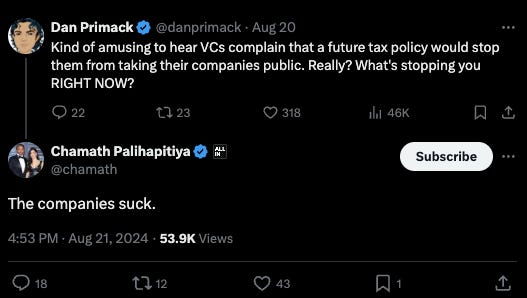Welcome to Cautious Optimism, a newsletter on tech, business, and power.
CO is back! New baby Octavia is home safe, mom is recovering well, and we’re adjusting to having two kids instead of one. Here she is!
📈 Trending Up: Stocks, after getting hammered last week … Chinese deflation … ChatGPT at work … EU VC (recall Balderton) … paid talking points … backup jobs … battery recycling … pig kidneys … capital gains taxes?
📉 Trending Down: Energy prices … crypto prices (bitcoin at $55k) … WeTransfer’s staffing … IPOs … honesty online … honesty online, redux …
🗞️ In Brief: A few weeks back, CO looked at arguments from two well-known investors that most AI models (LLMs) are worthless. The pace of technological progress is so quick today that the capital spent building new AI models is often depreciated to near-zero in months and quarters, let alone years.
“When Aleph Alpha raised more than $500 million last November to develop large language models, or LLMs, the funding bolstered the company’s reputation as one of Europe’s top rivals to OpenAI. Nearly a year later, however, the German startup is shifting away from the costly global race to build advanced artificial intelligence systems.
“The world changed,” Jonas Andrulis, Aleph Alpha’s chief executive officer, told Bloomberg. “Just having an European LLM is not sufficient as a business model. It doesn’t justify the investment.”
A geographic base for an LLM is silly; it’s not a competitive advantage so much as it is regulatory arbitrage wrapped in machine learning. Unique data is what matters, the argument goes, limiting the number of potential ‘winners.’ This is why Meta’s open-source-ish AI approach matters so much; if it can help keep non-closed-source AI moving on the strength of its data trove, all the better for startups.
The startups that didn’t try to take on OpenAI, that is.
Are we making the same mistakes again?
Crunchbase News reports that the IPO calendar is largely bereft today, quoting a venture investor who says that there is little hope for a rush of public offerings in the last months of 2024.
If you were looking forward to any particular debut — Circle, Turo, Brex, pick a name — expect to wait until next year. Alas.
But that isn’t stopping startups from raising lots of money. SSI just raised $1 billion, eGenesis snagged $191 million, DevRev recently scored $100 million at a $1.1 billion valuation, Finally recently raised $200 million in equity and debt, and SafetyCulture just raised $165 million in a mix of primary and secondary share sales. Just to pick a few.
The SafetyCulture news caught my attention not only because it’s an Australian company, but because of what it told SmartCompany, a publication focused on Aussie business. CEO Luke Anear said that an “IPO is not a career goal” for SafetyCulture, but may “be a function of the business.” In what circumstance? If his company “can’t get capital from the private market,” he said.
Anear doesn’t have to be in a hurry to take SafetyCulture public. Its latest funding round partially cashed out early investors, relieving pressure on the company to take itself public, thus making all its shares liquid.
Adding up all the above, we’re seeing a still stuck IPO market, a regular drumbeat of nine-figures rounds, and more — not less — financial engineering to keep VCs happy. All while former startups now sporting billion-dollar valuations stay private longer. It’s a bit like college students taking a fifth and sixth year to graduate because their parents are still writing checks, and they have no real forcing function to get out there and become real adults.
None of this is new. But after watching hundreds of unicorns fail to take advantage of the last IPO window leading to stuck backers and ever-private former startups simply stay put, you might think that the startup-venture nexus would try a new tack.
The simple counterargument to that complaint is that market incentives reward forced investor patience and startup anti-IPO intransigence. That’s simple enough to understand:
VC is under pressure due to a lack of DPI, but major VCs are still able to raise billions
Those fundraises necessitate large checks, meaning that late-stage startups can still raise ample private-market funding
VCs get paid to deploy capital, so they are happy to do so; startups get to stay private and unmolested by public quarterly earnings reports, and no one changes their behavior.
So what? Why do we care about more pressure being added to private market chambers not really built to hold the estimated $5.2 trillion worth of unicorn shares currently crammed in? We care because the end result isn’t super great.
For every Databricks or Stripe, there appear to be more clunkers than winners, even amongst the best-funded private market companies. Or as Chamath put it:
The definition of insanity is, well, you know.




